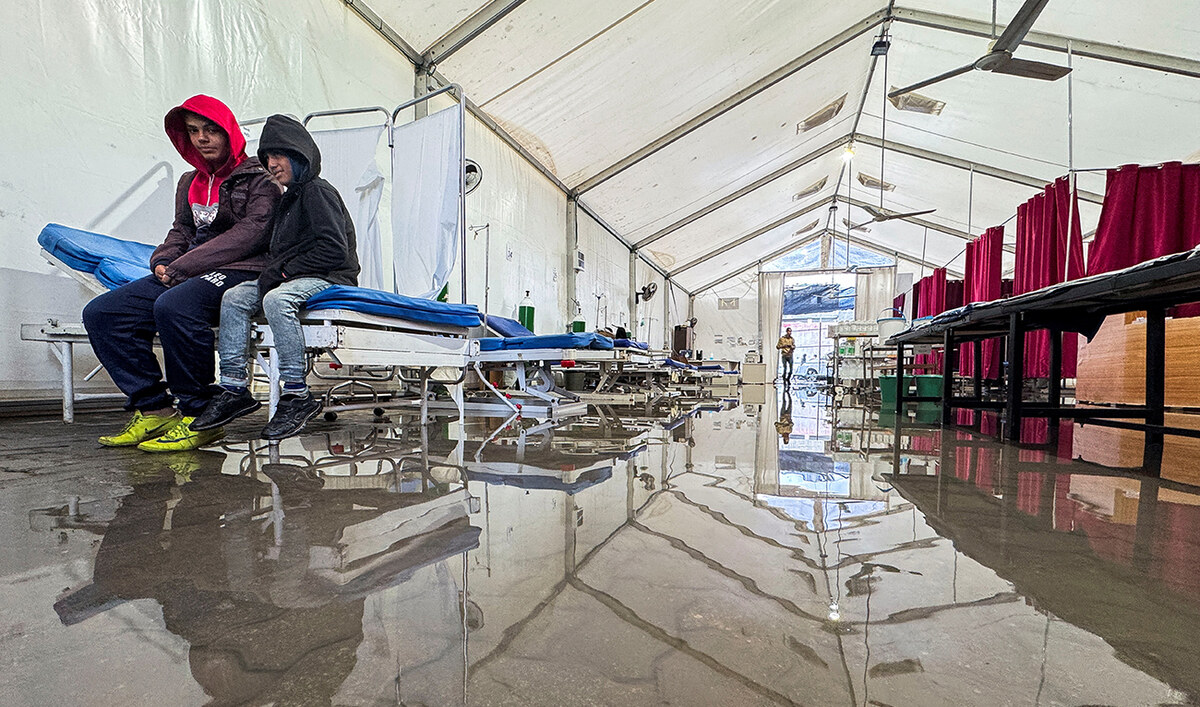ALGIERS: Abdelmadjid Tebboune, re-elected for a second five-year term, has sought to reshape his bureaucratic image into that of a reassuring figure, though his record remains tarnished by criticism over freedoms and human rights.
He was re-elected Sunday with almost 95 percent of the vote and a “provisional average turnout” of 48 percent, according to the electoral authority ANIE.
He was facing moderate Islamist Abdelaali Hassani, 57, who won 3.17 percent of the vote, and socialist candidate Youcef Aouchiche, 41, who won 2.16 percent.
Tebboune, 78, was elected in December 2019 with 58 percent of the vote, despite a record abstention rate exceeding 60 percent, amid the massive Hirak pro-democracy protests.
The demonstrations, which began in February of that year and led to the ousting of former president Abdelaziz Bouteflika, under whom Tebboune served in various ministerial roles, sought a sweeping political overhaul.
With a calm demeanour and, to some, an affable appearance, Tebboune attempted to appease the protests, pardoning a few dozen jailed activists.
He has claimed to uphold the Hirak’s “blessed” spirit, which he says freed the North African country from an oppressive past.
Yet he oversaw the imprisonment of hundreds of other activists, banned the movement’s weekly rallies, and cracked down on dissent with support from the military.
Five years on, Tebboune’s tenure still reflects “a democratic deficit,” said Hasni Abidi, an analyst at the Geneva-based CERMAM Study Center.
Algerian authorities “have maintained their repression of civic space by continuing their brutal crackdown on human rights,” Amnesty International said.
The London-based rights group denounced “a zero-tolerance approach to dissenting opinions” in “a climate of fear and censorship.”
Tebboune, however, has avoided addressing such accusations, instead touting his social and economic credentials and pledging more if re-elected.
The incumbent president frequently refers to Bouteflika’s final years in power as the “mafia decade,” when control of Algeria’s energy wealth was concentrated in the hands of a “gang.”
During his tenure, several key figures from that era, including Bouteflika’s brother Said, were convicted on corruption charges and imprisoned.
Tebboune claims he has since put Algeria, Africa’s third-largest economy, back on track, with the Ukraine-Russia war boosting natural gas prices to the country’s benefit as the continent’s top exporter.
He has capitalized on this by promising free housing, more jobs, a higher minimum wage and increased social pensions.
During campaigning, Tebboune aimed to appear close to the people, even wearing traditional Tuareg clothing while rallying in the southern Sahara region.
He has also courted the young vote — about a third of registered voters — and pledged to create 450,000 jobs and increase monthly unemployment benefits if re-elected.
In March, he expressed pride in being called “ammi Tebboune” (“Uncle Tebboune“), deeming it even “a paternal relationship.”
Running as an independent, Tebboune has sought to distance himself from political parties, which have lost credibility among many Algerians.
His supporters say he has revived the presidency, which became largely invisible under Bouteflika after his 2013 stroke.
“The presidency has shifted from being a phantom institution to a real center of power,” said the analyst Abidi.
However, critics argue that Tebboune rose to power with military backing.
Like Bouteflika, he serves as defense minister and supreme commander of the armed forces and has never challenged the military’s political role, calling it “the backbone of the state.”
He is often seen with chief of staff Said Chengriha at public events.
A graduate of the National School of Administration, Tebboune climbed the ranks in the 1980s as a prefect in several provinces, eventually becoming part of the state apparatus that the Hirak protests later wanted to be reformed.
In 1991, he served as minister of local communities under president Chadli Bendjedid, who was ousted in early 1992 as the Algerian civil war began.
Dubbed the Black Decade, the war saw the military step in to halt legislative elections after the Islamic Salvation Front won the first round and vowed to establish religious rule.
Tebboune largely disappeared from the political scene during the war, which ended in 2002, but returned when Bouteflika was elected in 1999, briefly serving as communications minister.
He held various other portfolios until 2002, followed by a decade-long hiatus.
Tebboune returned in 2012 as housing minister and became prime minister in 2017, though he was dismissed after only three months, allegedly confronting oligarchs close to Bouteflika.
Many of those oligarchs were later jailed for corruption during Tebboune’s presidency.
Once a heavy smoker with a thin moustache, Tebboune, now married with three sons and two daughters, quit smoking in 2020 after contracting Covid-19 and spending two months hospitalized in Germany.
He returned to Germany in 2021 for foot surgery.






































